June 15, 2025 | 21:59 GMT +7
June 15, 2025 | 21:59 GMT +7
Hotline: 0913.378.918
June 15, 2025 | 21:59 GMT +7
Hotline: 0913.378.918
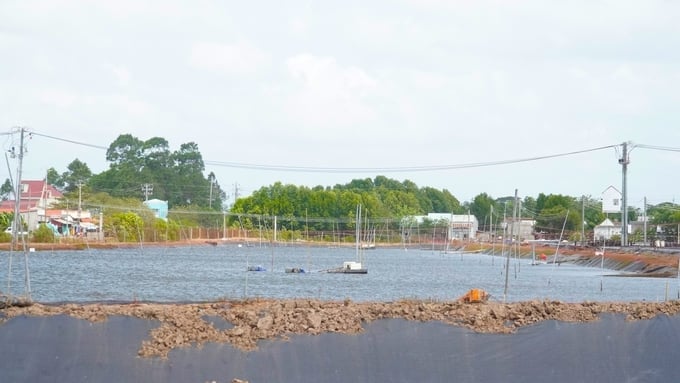
A survey conducted at the aquaculture area of Sao Ta Food Joint Stock Company revealed that the progress of stocking freshwater shrimp in 2024 reached approximately 70%, slower than the same period last year. Photo: Kim Anh.
In the 2024 freshwater shrimp season, Soc Trang province set a target of 50,820 ha for shrimp farming with an expected output of around 212,000 tons. Actual observations from shrimp farming households and businesses noted that the stocking progress was slower compared to the same period last year.
A survey conducted at the Xuan Phu Aquaculture Enterprise, part of the aquaculture area of Sao Ta Food Joint Stock Company in Vinh Tan commune, Vinh Chau town, revealed that about 70% of the shrimp seedlings had been stocked, equivalent to over 420 pounds. Hoang Thanh Vu, Deputy General Director of Sao Ta, assessed that the stocking progress was slow due to the excessively low quality of shrimp seedlings.
According to representatives from Sao Ta, the seedlings were sourced from units recognized nationwide for their excellent quality. However, inspections still found infections such as cloudy larvae syndrome (TPD) and enterocytozoon hepatopenaei (EHP)... These are among the main reasons leading to success rates in ponds being only around 40-50%.
Mr Vu mentioned that many enterprises are currently selling shrimp below production costs, and some are in a holding pattern to retain labour while awaiting better opportunities.
To mitigate the risk of disease outbreaks in shrimp farming, Sao Ta has implemented a shift in shrimp stocking methods by adopting high-density stocking, shortening the farming period, and harvesting smaller-sized shrimp (approximately 100 shrimp/kg) instead of larger sizes as done previously. This method has proven effective for both the company and local farmers in Vinh Chau town.
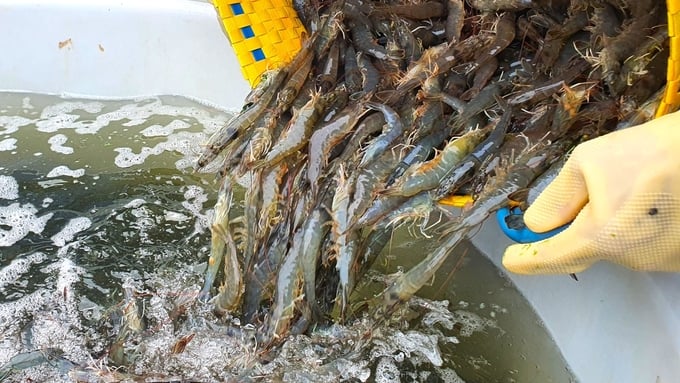
Currently, the purchasing price of shrimp at factories is showing a downward trend, fluctuating between VND 110,000 - 112,000/kg (for the size of 40 shrimp/kg). Photo: Van Vu.
Mr Huynh Ngoc Nha, Director of the Soc Trang Department of Agriculture and Rural Development, stated that recently, the department has made numerous recommendations to the specialized agencies under the Ministry of Agriculture and Rural Development, emphasizing rigorous control over the quality of shrimp breeds.
In addition, the agricultural sector of the province is focusing on establishing supply chains from shrimp farming households, and enterprises, to production units and aquatic supply businesses, aiming to help shrimp farmers access input materials at the lowest possible prices.
An example of this effort is Sao Ta Company, which has successfully built a supply chain enabling them to procure shrimp feed at prices ranging from VND 27,000 to VND 28,000/kg.
Meanwhile, small-scale shrimp farming households without direct connections often face challenges in accessing high-quality, cost-effective feed. They typically rely on intermediary purchases, where they pay upon shrimp harvest, resulting in costs rising to VND 40,000 - 42,000/kg.
Recently, during a survey on the infrastructure of aquaculture areas in Vĩnh Châu town, Mr Tran Van Lau, Chairman of the People's Committee of Soc Trang province, affirmed that agriculture remains the backbone of the province's economy until 2030. The primary strengths lie in shrimp farming and aquatic exploitation.
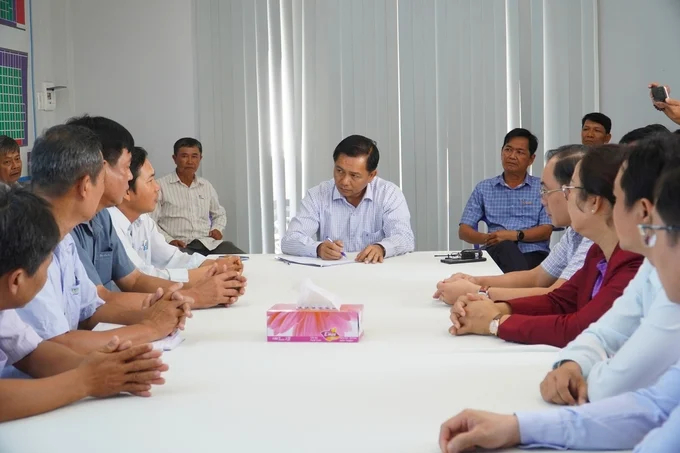
Mr. Tran Van Lau, Chairman of the People's Committee of Soc Trang province, has been investigating the difficulties faced by seafood enterprises in the province. Photo: Kim Anh.
Amidst the general challenges in the export market, Mr. Lau has urged the Department of Agriculture and Rural Development to address issues related to shrimp breeds, input material prices, and production costs promptly.
"In aquaculture, water quality and shrimp breeds are two crucial factors for success. If these are not ensured, it will be very difficult. The Department of Agriculture and Rural Development must submit recommendations to the Ministry of Agriculture and Rural Development to support the selection of high-quality breeds, intervening with seed production facilities", the Chairman of the People's Committee of Soc Trang province emphatically directed.
Additionally, the agricultural sector must take responsibility for building supply chains to help shrimp farmers access affordable, quality input materials. This approach aims to solve the problem of "large companies purchasing at low prices while small-scale farmers buy at high prices, leaving the latter disadvantaged."
Mr. Lau also proposed that the Department of Agriculture and Rural Development collaborate with the Department of Industry and Trade and local authorities to explore solutions for finding new markets domestically and internationally. There is an emphasis on enhancing product promotion on trading platforms to seek markets and partners.
A leading shrimp export company in Soc Trang province expressed that China is one of the largest markets globally, coveted by every producer and exporter.
Specifically for the shrimp industry, China is a major importer of shrimp worldwide. However, Chinese partners mostly prefer raw material segments to serve their processing industry domestically.
Currently, Ecuador dominates a significant market share as a supplier of raw shrimp to China. In contrast, Vietnamese shrimp products offer a diverse range of processed items that cater well to the needs of Chinese consumers.
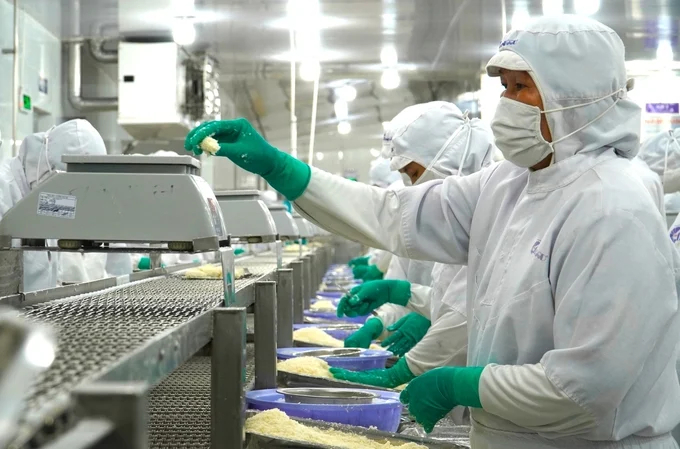
The shrimp products from Vietnam are diverse in processed forms and can effectively meet the needs of consumers in China. Photo: Kim Anh.
However, Mr. Vo Van Phuc, CEO of Cleanfood Vietnam Joint Stock Company, stated that currently, China does not have a standard related to food safety control for shrimp products. This situation is not suitable for large enterprises like Cleanfood, which are developing a variety of product lines for export to demanding markets such as the US, Canada, and the EU...
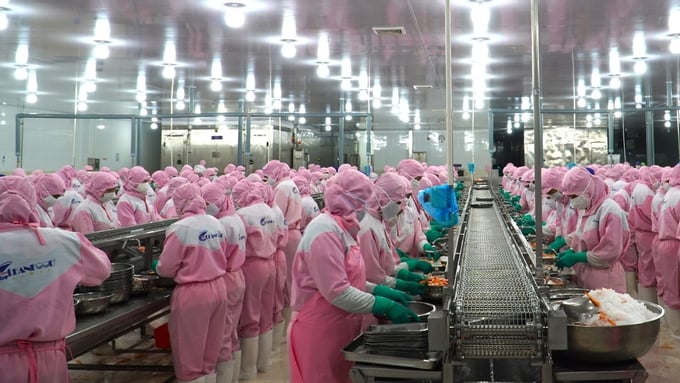
The businesses in Soc Trang desire to connect and access the Chinese market to seize the opportunity of introducing many value-added shrimp products into this country. Photo: Van Vu.
In assessing the market in the near future, Cleanfood's leadership anticipates ongoing challenges. They hope that central and local government departments will increase exchanges and understanding of the Chinese market. Particularly, connecting large enterprises in the Vietnamese shrimp industry in general, and Soc Trang province in particular, with businesses in China to create opportunities for introducing many value-added shrimp products into this country.
Translated by Hoang Duy

(VAN) The working delegation from the Ministry of Agriculture and Environment conducted an important trip to the Netherlands to strengthen strategic partnerships and sustainable development in the agricultural sector.

(VAN) The letter ‘A Plea from the Ocean’ not only evokes emotion but also awakens the human conscience to the responsibility of protecting life on Earth.

(VAN) The Department of Agriculture in South Africa has announced the country’s first mass vaccination of poultry to prevent local birds from contracting avian influenza.

(VAN) Establishment of the Mekong Delta Regional Agricultural Linkage Center, aiming for a closed value chain, deep processing, trading platforms, and international market connectivity.

(VAN) Gia Lai province has recently recorded 460 rare species of animals and plants, contributing to forest conservation and biodiversity planning in the region.

(VAN) Ms. Caroline Beresford, New Zealand Ambassador to Vietnam, expressed confidence that agricultural cooperation between Vietnam and New Zealand will develop sustainably, be climate-resilient, and promote gender equality.

(VAN) Vietnam reaffirms its commitment to international cooperation in fostering sustainable and responsible fisheries while ensuring resilient livelihoods for small-scale fishing communities.